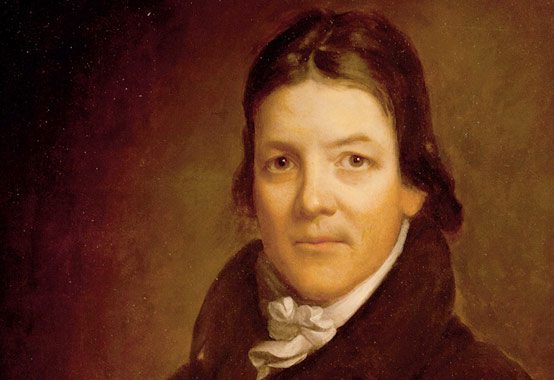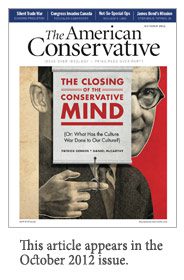Who Was John Randolph?

John Randolph of Roanoke was everything the modern conservative might despise: aristocratic, sexually ambiguous, occasionally irreligious, anti-party, and the sworn enemy of military adventurism. His personality suggests he might have had more in common with the late Gore Vidal than Sarah Palin. Yet Randolph still stands out as one of the most important conservative thinkers of the generation after the Founding Fathers. David Johnson’s fine new biography of the Virginia gentleman is a timely reminder that conservatives come in all shapes and sizes—and often disagree.
The contemporary American conservative tradition is a postwar invention. Until the 1960s, conservatism was largely dismissed by historians as a psychological defect—an unhealthy fetish for the certainties of the past. That consensus collapsed as brilliant men like William F. Buckley Jr. began to write intelligently about a “conservative tradition” that was part of the tapestry of American thought, while the political success of Ronald Reagan forced scholars to rewrite the official narrative of unstoppable liberal progress. The Buckleyite “tradition” and the electoral success of the GOP became conflated. At the dawn of the Millennium, historians were forced to confront the possibility that conservatism had flourished because its philosophy is actually older and more popular than liberalism’s.
The danger of Buckley’s effort to construct a tradition is that it slowly became a template. Anyone who doesn’t match the specifications of “born again,” “tax-cutting,” and “foreign-policy hawk” can now officially be labeled “unconservative.” The result is that men like libertarian Ron Paul, paleoconservative Pat Buchanan, or cosmopolitan Rudy Giuliani—all of whom represented legitimate dimensions of conservatism—could no longer get an invite to the party. Republican presidential primaries have evolved from talent contests to the priest-selection ritual of some bizarre and parochial religion. “I swear by almighty God never to raise taxes…”
How fascinating it is, then, to read the life of John Randolph, a man who defied the official conservative tradition on several counts. What stands out is his humanity, both common and aristocratic. He was born the scion of rich tobacco planters in 1773. A genetic aberration—Johnson diagnoses it as Klinefelter’s syndrome—left him beardless and deprived him of the pleasures and horrors of puberty. He was a squeaker, with a high-pitched voice that gave his famous epigrams great camp value. (Randolph said that one of his enemies was “a man of splendid abilities, but utterly corrupt. He shines and stinks like a rotten mackerel by moonlight.”)
A significant amount of the book is given over to Randolph’s physical suffering. For example,
He was ‘racked with pain and never for two hours together free from some affliction’ of his stomach and bowels. He suffered from ‘rheumatism and erratic gout’ and a most distressing and obstinate complaint—chronic diarrhea. … He treated himself with a variety of concoctions, including liberal doses of opium, but worried that there ‘is nothing left for the medicine to operate on.’
Randolph tried to distract himself by hunting. On one occasion, he poured gunpowder on a still burning charge and burned his hand. He observed, “What so many patriotic personages have, for years, been labouring to accomplish is at last effected, although not precisely in the way they aimed at … I have been blown up.”
His behavior was more like that of a British Tory gentleman than a revolutionary republican. He wisely avoided formal education and excelled in drinking and socializing instead. In his late teens, Johnson reports, our hero lived “a life of restless aimlessness. ‘You inquire after my plans,’ he wrote a friend. ‘I have none. … I exist in an obscurity from which I never shall emerge.’”
What drew him to the forefront of American society was the sweetest opiate of them all—politics. In the 1790s, the young republic was still fighting over what it stood for. The Federalist-controlled Congress passed the Alien and Sedition Acts in 1798, which were the authoritarian forerunner of today’s PATRIOT Act. Jefferson’s Democratic Republicans opposed the acts, and Randolph was among their number. Sadly, we have no written record of his speeches on the subject, but they were sufficiently powerful to get him elected to Congress at the tender age of 26. When he approached the speaker’s dais to take his oath, the speaker wondered aloud if Randolph was old enough to serve. “Ask my constituent,” the freshman replied.
Jefferson was a cousin, so we might have expected the two to form a familial and philosophical alliance. But Randolph quickly proved to be a thorn in the side of Jefferson and almost every president who followed. He became, in Johnson’s words, “a party unto himself, a republican purist who would sacrifice no principle for political success or collegial acceptance. He was the ‘third something’ of American politics—a Tertium Quid.” Randolph opposed the purchase of Florida and the creation of a national bank because he saw these things as going beyond the limits of government as laid out in the Constitution.
Crucially, that didn’t make him an anti-elitist republican of the Ron Paul variety. His politics were rooted in European-style snobbery. Randolph believed that, if left alone, a well-ordered society could govern itself. “I am an aristocrat,” he said. “I love liberty, I hate equality.” Liberty could not be traded for security or sold off to the highest bidder for short-term reward. It guaranteed the space within which men like Randolph could rule. A cynic might call him feudal.
And yet so radical was his politics, and so carefree his lifestyle, that he sometimes jumps off the page like a revolutionary. He lost his seat in Congress because he opposed the War of 1812 and the militaristic nationalism that motivated it. Randolph warned the House that it was a “war not of defense but of conquest, of aggrandizement, of ambition; a war foreign to the interests of this country, to the interests of humanity itself.” The Constitution, remember, “was not calculated to wage offensive foreign war—it was instituted for the common defense and the general welfare.”
Randolph was no pacifist. He warned Congress that war could lead to a slave rebellion in the South, a nod to the fact that he himself was involved in one of the greatest, most vilest acts of violence ever perpetrated on a people. Johnson stresses that Randolph was opposed to slavery in the abstract and provided for the freedom of the men and women that he owned after his death. But there’s no escaping that the liberty promised in the hallowed Constitution did not extend to everyone. In this matter, Randolph displayed some of the least charming characteristics of the Old South.
In an interview about his book, Johnson told Human Events that Randolph was “more civil” than many politicians today because he always issued his insults “in good English.” I have to disagree. Randolph could be chivalrous but also quick to take offense and inclined towards bloodshed. Johnson writes of an incident when the House adjourned after a debate and an opponent, Willis Alston, slandered Randolph on the stairs:
Randolph brought down his cane on Alston’s head, knocking off his hat and drawing blood. Alston turned and attempted to fight back, but he was on lower steps and could not reach Randolph. Some of the ‘ruffians who were with him,’ wrote Randolph, ‘wrested the cane from behind and put it in his hands.’ Randolph stared down at Alston and waited for a blow.
But Alston dared not return fire. The very next paragraph details Randolph receiving one duel challenge after another, equally violent debate. It’s difficult not to get the impression that our hero was a bully, rhetorically and physically. Honor was frequently invoked as an excuse for a good fight.
Some have suggested that another reason for his constant displays of manly combat might have been his “ambiguous sexuality,” in the words of historian Andrew Burstein. The conservative writer Bill Kauffman has described Randolph as “a bachelor who seems to have nurtured a crush on Andrew Jackson.” In fact, Johnson reveals that medical evidence proves he was almost a eunuch: “Dr. Francis West conducted a post-mortem examination of Randolph and recorded that the ‘scrotum was scarcely at all developed,’ with only a right testicle ‘the size of a small bean.’” Johnson dismisses psychoanalyzing his subject further at this point, but it feels crucial. Walking around with generative organs so small is bound to have some impact upon a man’s human and political relations.
 All this talk of scrotums and testicles emphasizes that the takeaway from this well-researched, judicious biography is the importance of personality to the history of conservatism. There is no straight line leading from the politics of John Randolph to that of Ron Paul, any more than there is a line from Jefferson to Romney. It’s a point that Johnson made in his Human Events interview. Far from trying to cash in on the tantalizing similarities between Randolph and Paul, when asked, “Are there any modern-day comparisons to John Randolph?” Johnson replied, “Absolutely not.”
All this talk of scrotums and testicles emphasizes that the takeaway from this well-researched, judicious biography is the importance of personality to the history of conservatism. There is no straight line leading from the politics of John Randolph to that of Ron Paul, any more than there is a line from Jefferson to Romney. It’s a point that Johnson made in his Human Events interview. Far from trying to cash in on the tantalizing similarities between Randolph and Paul, when asked, “Are there any modern-day comparisons to John Randolph?” Johnson replied, “Absolutely not.”
But there are consistent attitudes—rather than policy prescriptions—spanning the centuries that suggest the existence of a historical conservative archetype: stubbornness, romanticism, a loyalty for the small and local that trumps the grand and national, an affection for custom, a suspicion that equality ends after birth, a resistance to modes of thought that elevate fine ideas above the freedom of the individual. Every new generation of conservatives has to turn those vague sentiments into an agenda—sometimes of resistance, sometimes of reform. The challenge is to be something more than just a privileged spoilsport.
Timothy Stanley is author of The Crusader: The Life and Tumultuous Times of Pat Buchanan and is a blogger for the Daily Telegraph.
Comments